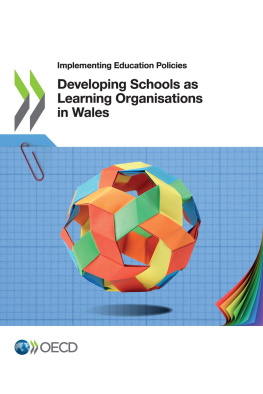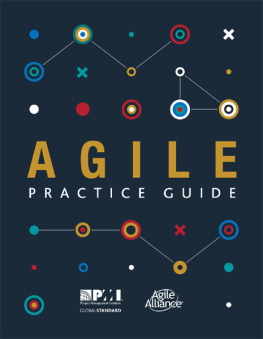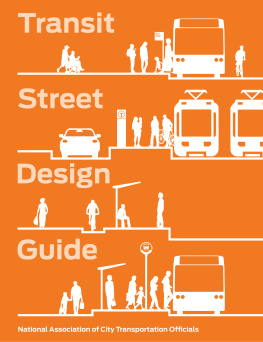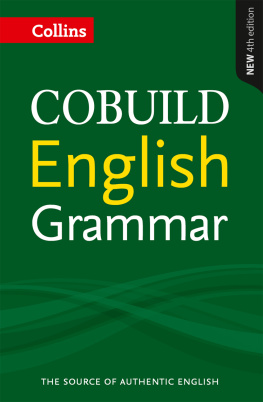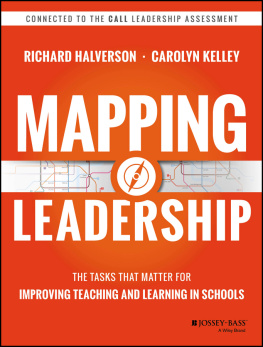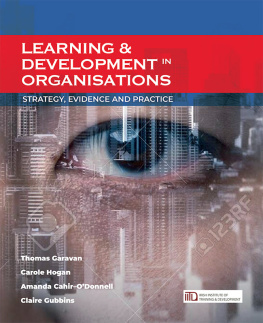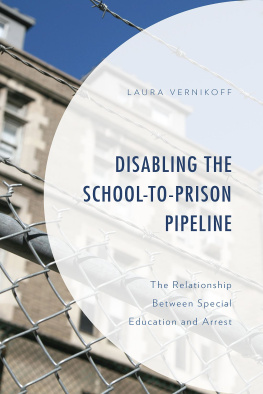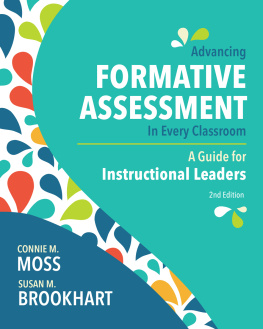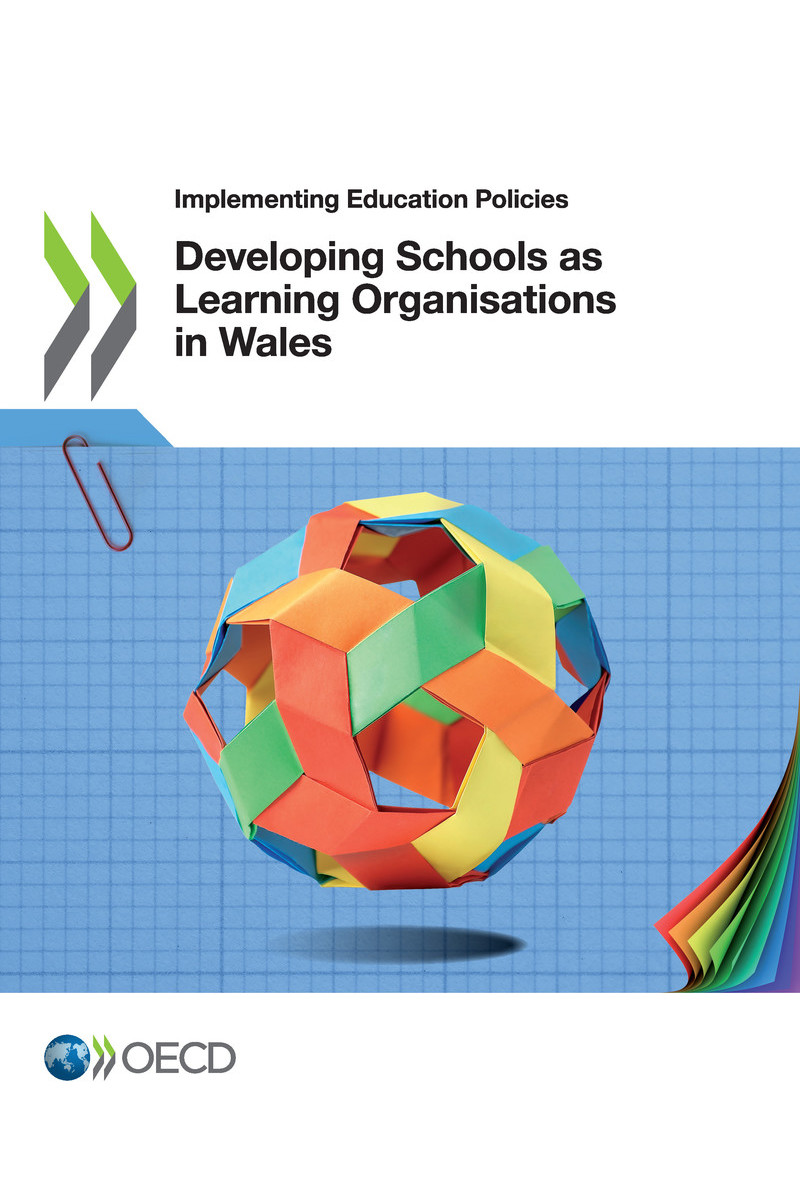Implementing Education Policies
Developing Schools as Learning Organisations in Wales
Please cite this publication as:
OECD (2018), Developing Schools as Learning Organisations in Wales , Implementing Education Policies, OECD Publishing, Paris.
https://doi.org/10.1787/9789264307193-en
Metadata, Legal and Rights
ISBN: 978-92-64-30718-6 (print) - 978-92-64-30719-3 (pdf) - 978-92-64-30789-6 (HTML) - 978-92-64-30788-9 (epub)
DOI: https://doi.org/10.1787/9789264307193-en
Series: Implementing Education Policies
ISSN: 2617-6572 (print) - 2617-6580 (online)
This work is published under the responsibility of the Secretary-General of the OECD. The opinions expressed and arguments employed herein do not necessarily reflect the official views of OECD member countries.
This document, as well as any data and any map included herein, are without prejudice to the status of or sovereignty over any territory, to the delimitation of international frontiers and boundaries and to the name of any territory, city or area.
The statistical data for Israel are supplied by and under the responsibility of the relevant Israeli authorities. The use of such data by the OECD is without prejudice to the status of the Golan Heights, East Jerusalem and Israeli settlements in the West Bank under the terms of international law.
Photo credits: Denisfilm/iStock; optimarc/Shutterstock; koya979/Shutterstock.
Corrigenda to OECD publications may be found on line at: www.oecd.org/publishing/corrigenda .
OECD 2018
You can copy, download or print OECD content for your own use, and you can include excerpts from OECD publications, databases and multimedia products in your own documents, presentations, blogs, websites and teaching materials, provided that suitable acknowledgement of OECD as source and copyright owner is given. All requests for public or commercial use and translation rights should be submitted to .
Foreword
This study is part of the OECDs efforts to support countries in the design and effective implementation of their education policies, grounding these efforts on evidence, and multidisciplinary tools and approaches.
Wales is committed to providing high-quality and inclusive education for all its citizens. It in 2011 embarked on a large-scale school improvement reform that has become increasingly comprehensive and focused on the ongoing development and implementation of a new, 21st century school curriculum. Wales considers the development of schools as learning organisations a key means for empowering them to bring the new curriculum to life. It recognises this will require concerted effort and in many cases it will mean that teachers, support staff, school leaders and many others involved will need to expand their skills. As such, the development of a thriving learning culture in schools and other parts of the education system is expected to play a pivotal role in putting the curriculum into practice in schools throughout Wales.
This report aims to support Wales in realising this objective. It assesses the extent to which schools in Wales have developed as learning organisations, and identifies areas for further improvement at both school and system levels.
Following an introduction to this report and a description of Wales school system (Part I, Chapter 1) the report is organised the following:
Part II, the Schools as Learning Organisations Assessment , describes and analyses the extent to which the key characteristics of a learning organisation already exist in schools. It uses Wales schools as learning organisations model as point of reference to identify strengths and areas of improvement. Both a general assessment (Chapter 2) and a more detailed analysis are provided (Chapter 3). It concludes by proposing some points of reflection and action for schools to consider as they embark on the journey to develop as learning organisations.
Part III, System Assessment for Developing Schools as Learning Organisations , analyses the system-level conditions that can enable or hinder schools developing into learning organisations. It explores the question of what system-level policies are enabling or hindering schools to develop as learning organisations, and offers a number of concrete recommendations for strengthening policies, enhancing policy coherence and further policy action (Chapter 4).
It continues by exploring the question of how Wales can ensure the effective implementation, or realisation as it is often referred to in Wales, of its schools as learning organisations policy (Chapter 5). It concludes with a number of recommendations for consideration by the Welsh Government and other stakeholders at various levels of the system.
I hope this report will support Wales in its reform efforts and help realise its ambitions for its children and young people by bringing its new, 21st century curriculum to life in schools across the country. The OECD is there to help Wales in this effort.

Director for Education and Skills and Special Advisor
on Education Policy to the Secretary-General
OECD
Acknowledgements
This report has been developed as part of OECDs work on implementing education policies, conducted by the Policy Advice and Implementation Division of OECDs Directorate for Education and Skills. It is the result of an assessment of the development of schools as learning organisations in Wales, informed by international experience and best practices from OECD countries. The assessment made use of a mixed-methods study design, including a Schools as Learning Organisations Survey and many exchanges and consultations with different experts and stakeholders in Wales.
The OECD team (see Annex A) is indebted to the Welsh Government Education Directorate for supporting this innovative pilot initiative. We thank Kirsty Williams, the Cabinet Secretary for Education, for commissioning this assessment and her support throughout the process resulting in this report, including the launching of Wales schools as learning organisations model. Furthermore, we would like to acknowledge the support of the Steve Davies, the Director of Education, who has been a driving force behind this assessment. We are also particularly grateful to Lisa Clarke, Professional Learning Programme Lead, and Joanne Davies, Professional Learning Policy Lead, for co-ordinating the whole assessment process.
We would like to also thank the members of the Schools as Learning Organisations (SLO) Pilot Group (see Annex B) who (among others) contributed to the development and implementation of the SLO survey, and provided in-depth feedback and advice on earlier drafts of this report.
Furthermore, we want to convey our appreciation to all those school leaders, teachers and learning support workers that found the time in their busy schedules to complete the SLO survey. Their views and comments have proven invaluable to this assessment.
Various policy missions were also conducted during 2017 and 2018 during which the OECD team was able to interview and consult a wide range of experts and stakeholders from various levels of the education system. Special thanks go to Graham Donaldson for his guidance and support throughout the whole process of conducting this assessment. We want to convey our sincere appreciation to all these people for providing us with a wealth of insights by sharing their views, experience and knowledge.

